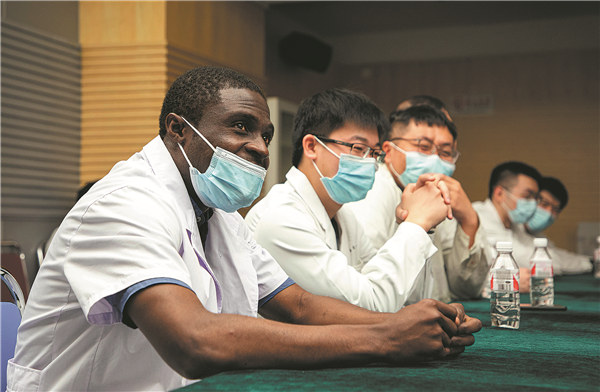A Congolese heart guides Chinese healers


In a conference room at The First Hospital of China Medical University in Shenyang, Liaoning province, members of the 22nd Chinese medical team bound for The Gambia are undergoing pre-departure training. All eyes are on a young black man at the podium, wearing a white lab coat and speaking in a fluent Northeastern Chinese dialect.
The man is Muisha Mbikyo Bienvenue, a doctoral student in internal medicine at the university from the Democratic Republic of the Congo (DRC). This is the sixth time he has provided pre-departure training for medical teams heading to Africa.
"Over 10 years ago, I came to China to study medicine at my father's suggestion. Now I've come to understand the stark differences between the healthcare systems of China and my country, particularly in terms of resource distribution, service coverage, and technical proficiency," Bienvenue explained.
Since its inception in 2010, the International Education School of China Medical University has been committed to training healthcare professionals for the global medical community. To date, it has nurtured nearly 2,300 students from 108 countries.
When Bienvenue was young, his mother suffered from heart disease, but healthcare in his hometown was so underdeveloped that even getting a basic electrocardiogram required traveling long distances. "By the time I was 16, I had a clear goal — to become a cardiologist and treat my mother," he said.
Unfortunately, Bienvenue was unable to fulfill his dream in time to save her; she passed away five years ago. "Her passing became my driving force. I want to help more patients suffering from heart disease, just like my mother."
Since arriving in China, Bienvenue has worked arduously and has become one of the university's outstanding international students.
"He is an exceptionally hardworking and diligent student who has earned the trust of many patients," said Sun Yingxian, head of the cardiology department at the First Hospital.
To support Bienvenue's aspirations, the department has established a research project on a non-pharmacological treatment for high blood pressure, hoping to help improve healthcare in the DRC.
Liaoning, as the designated aid provider for The Gambia, selects outstanding medical professionals annually to form medical aid teams. China Medical University has actively participated in this initiative, leveraging its talent pool to make a meaningful impact.
In the training sessions for the medical team heading to The Gambia, Bienvenue provided practical guidance, including key cultural and religious considerations as well as differences in medical practices.
"In The Gambia, many residents have distinct customs that differ significantly from those in China. For instance, during clinical diagnosis, doctors must obtain the patient's consent before any physical examination. Sudden contact can be perceived as disrespectful. This is quite normal in China, but in The Gambia, it requires careful attention," Muisha explained.
He also taught the team basic Swahili phrases to help them adapt more quickly to the local environment.
Bienvenue emphasized the high expectations Gambian patients have for Chinese doctors. "When patients come to the hospital, it's often because they have no other choice. They see doctors as their last hope," he said. "For many, the arrival of Chinese medical teams feels like a lifeline."
He also pointed out that many members of the medical team are his teachers. "When I shared with them the expectations African patients have for their doctors, I could sense their deep, selfless care for the people of Africa," he said. "They leave their families behind without hesitation, carrying the spirit of healing and humanitarianism to the continent."
As China-Africa cooperation deepens, medical aid has become both a symbol and a testament to this evolving relationship. Over the past 60 years, China has sent over 25,000 medical personnel to African countries, treating hundreds of millions of patients and training many local healthcare professionals.
"Every time we talk about the future, I see a firm resolve in Bienvenue's eyes," said Liang Songnian, leader of the third medical aid team to The Gambia from Liaoning and deputy chief physician of the interventional therapy department at the First Hospital. "He often speaks about his desire to return to the DRC after graduation to alleviate his people's suffering and contribute to his country's healthcare."
Xing Zhiyuan contributed to this story.



































